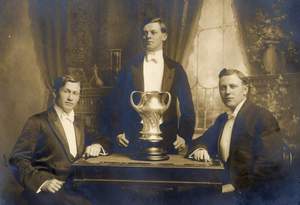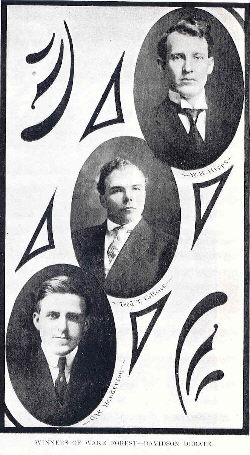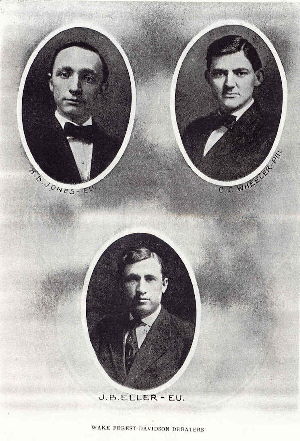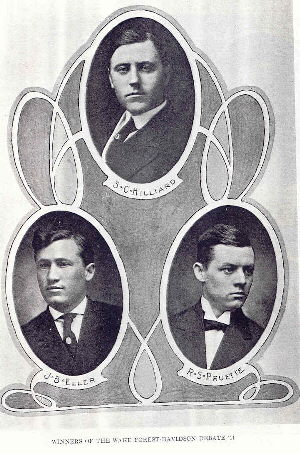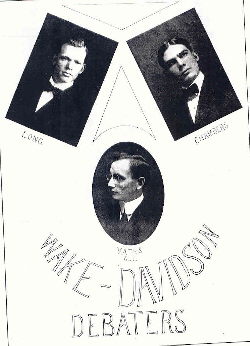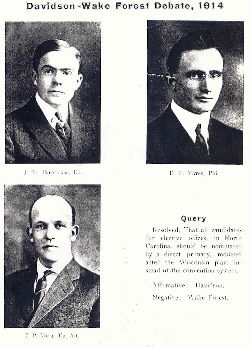1909-1911 Davidson/Wake Forest Debates
Wake Forest Wins and Holds the Cup
From the Biblical Recorder, 1911
Three years ago the Greensboro Chamber of Commerce offered a handsome Silver Loving Cup to the debating team from Davidson and Wake Forest Colleges which would win it at least twice in three annual contests to be held in the city of Greensboro.
The first contest came in 1909 and was won by Wake forest. In the 1910 contest the cup was awarded to Davidson. The deciding contest came on April 17th of this year when the cup was won again and finally by Wake Forest. The Davidson debaters did well indeed, and the Wake Forest victory was won only by fine forensic ability and debating skill of a high order. The question was–“Resolved, that the United States should fortify the Panama Canal.” Davidson had the negative; Wake Forest, the affirmative.
We are glad to introduce to our readers the winning team and their trophy–Mr. J. B. Eller on the left, and Mr. S. C. Hilliard on the right. Mr. Rowland S. Pruett, the alternate, stands behind the cup. “Rah! Rah! Wake Forest!”
Below are four newspaper accounts of the 1090-1911 Debates. Many of the arguments are presented. Articles promoting the debates often provide colorful insights to the celebratory and important of the debates. Also procedures of the times are of interest.
Special Trains & Special Invitations
Greensboro Daily News, April 16, 1911
Every student’s heart swells with joy when he thinks of the special train which will be run Monday evening to Greensboro. Wake Forest plays A & M college (becomes NC State) in Raleigh in the afternoon of the same day. The game will be called early and many o the same fellows who will be there supporting the baseball team will immediately after the game board the special train for the Gate City. They will be in the Grand opera house arrayed in a solid phalanx with the banner of Old Glory and Black floating on the breeze when the debate opens.
Dr. Poteat read before the student body this morning an invitation from the young ladies of the Philathea classes of the Presbyterian and Baptist churches of Greensboro requesting the representatives from Davidson and Wake Forest to be present at a reception immediately after the debate in the Smith Memorial building, which invitation was gladly accepted.
The Daily Record, Greensboro, N.C., March 28, 1910
Each team will have fifty minutes at its disposal to use as it sees fit, provided no speaker shall use more than thirty-five minutes nor either side use more than fifteen minute in rejoinder.
College Boys Debate
Greensboro, Wed. April 14, 1909
Wake Forest and Davidson Discuss Subsidy for Merchant Marine-Decision in Favor of the Baptists.
Wake Forest was victorious over Davidson College in the intercollegiate joint debate here Monday night, the subject of the discussion being; Resolved, That the United States government should adopt the policy of subsidizing her merchant marine.” Wake Forest had the negative side of the question and while the Davidson boys made, splendid arguments, the decision of the judges was not a surprise. The winning team received the handsome loving cup offered a by the Greensboro Chamber of Commerce as a prize.
Wake Forest was represented by W. H. Hipps and F. T. Collins and Davidson by S. A. Linley and R. A. McLeod, all the speakers being greet by the enthusiastic applause by the audience that filled the auditorium of the Smith Memorial building, where the debate was held. Perhaps the Wake Forest rooters were a little more vociferous.
Davidson argued for a subsidized merchant marine because It would benefit the postal service, liberate American commerce from the domination and control of foreign influence, and Emancipate the navy from Its present slate of Impotency. Wake Forest opposed the principle because it is unsound from an administrative and economic standpoint, contending it would open the door to corruption and foster monopolies.
Mayor Brandt presided over the debate and introduced President Sternberger for the Chamber of Commerce, who “welcomed the visitors to the city.
Mr. Linley opened the debate for Davidson and contended that a subsidy is not a free gift, because it brings returns in the development of the nation. He advanced the argument that a subsidized merchant marine would enhance the value of the postal service and thereby benefit American industries. He quoted Senator Simmons in support of a subsidy to liberate American commerce from foreign influence, arguing that it would especially benefit the South in extending our cotton trade in Orient. The subsidy would also emancipate the navy from dependency upon foreign merchant marine.
Mr. Hipps, the first speaker for Wake Forest, argued that the principle of a subsidy is unsound and that its adoption would lead to a paternal , government and revolution. The tax of the many should not be used for the support of a few. He argued that a subsidy would not benefit the mass and referred to the history of the ocean and railroad mail subsidized lines as proof of the failure of the System from an economic standpoint. He contended that England and Germany do not maintain their merchant marine by subsidy.
Mr. McLeod, for Davidson referred to the decadence of the merchant marine, saying it could be restored to its former place of power by a subsidy founded on correct business principles. The principle is economic because it provides only for such lines and ships as are necessary and it is feasible because it would violate no treaty. He referred to the growth of American shipping after the adoption of the subsidy of 1845 and asked why America should spend millions on harbor Improvements for the benefit of subsidized vessels of foreign nations.
Mr. Collins for Wake Forest advanced the argument that the fall of the American merchant marine was due to the oppressive navigation laws, which are a result of the protective tariff. These shackles must be if an effective remedy is to be applied. He argued that the tariff operates against the American ship owner and said there is no sense in hampering a business and the taxing other industries to help it. Such a system is worse than socialism. If the merchant marine is to he built up, the government should adopt the” principle of discriminating duties or a tonnage tax.
Each of the debaters had a rejoinder of 10 minutes and occupied the time in hammering the opposition. The judges were: President Hobbes of Guilford College; President Moffitt, of Elon College. and Judge R. S. Strudwick. Their decision was announced immediately after the closing of the debate.
Following the debate the students of Wake Forest and Davidson in the city were tendered a reception at the First Baptist church. The ball game in the afternoon and the debate at night brought several hundred students to the city. A special train was run from Davidson, to bringing in addition to the students, many friends of the college from Charlotte and other points in that section.
The Loving Cup Won by Davidson
Daily Record, Greensboro, N.C., Tuesday Evening, March 29, 1910
Interesting Debate Last Night at the Small Memorial Building.
Excellent Arguments
Trophy Offered by the Chamber of Commerce Captured by the Debaters Representing Davidson College From the Representatives of Wake Forest College-Each Side Having now Won the Cup a Third Debate Will be Held In Greensboro Next Spring to Decide Who Will Keep the Cup Permanently.
At the memorial building last night the representatives of Davidson proceeded to show everybody and sundry that baseball was not the only thing on the curriculum at their institution of learning. The plunged into government last night and even before the announcement of the judges the string of defeat, which hunger in the breasts of the ever-faithful Davidson rooters had been lessened to some extent. The consolation which they felt was soon converted into joy, for after about two minutes deliberation the judges, W. P. Bynum, Jr.., J. C. Buxton and R. M. Douglas, decided that the silver challenge cut given by the Greensboro Chamber of Commerce and which was taken by forces last year by Wake Forest College should become the property of Davidson. With the announcement came the outburst of long pent up enthusiasm of the faithful Davidson supporters. Past defeats were forgotten in the great victory and the demonstration followed worthy of the eloquence and brilliant effort of the four speakers.
Mr. L. J. Brandt presided over the debate and Mr. C. M. Robinson, of Davidson, and P. E. Powell, of Wake Forest, acted as marshals.
The victory of Davidson over Wake Forest assures a third debate in Greensboro between these tow institution, for it was one of the conditions of donors that the cup should go to the college, as a permanent evidence of ability in debating that won the best out of a series of three. Last year the judges decided in favor of Wake Forest and there the cup has been faithfully guarded until last night, when it was put in charge of the student body of Davidson. The debate next year will decide where it was to be kept permanently.
The question debated was a very interesting one, being: “Resolved, that the legislature initiative and referendum should be introduced in our State governments.” In presenting their contentions and ideas on the question each of the speakers acquitted himself with great credit.
After the debate the young ladies of the First Baptist and First Presbyterian churches entertained the college . . . teams as a delightful reception in the rooms of the young Women’s Christian Association.
To Davidson Goes the Oratorical Trophy
Greensboro Daily News, March 29, 1910
Judges Announced Verdict After Two Minutes Deliberation – Victory for Presbyterians Assures Debate Here
Next Year – Young Ladies Entertain College Men.
Fired on by crushing defeat administered by Guilford in the annual athletic event of an eventful Easter Monday in Greensboro, the representatives of Davidson College plunged into government last night, and even before the announcement of the judges, the sting of defeat lingered in the breasts of the faithful Davidson rooters had been given a soothing panacea, for it was realized that defeat, if such much come, would not be the result of “errors of judgment” as was charged in the afternoon. This feeling of consolation was soon turned to joy, however, for after two minutes deliberation the judges, W. P. Buxton and R. M. Douglas, decided that the silver cut, offered by the Greensboro chamber of commerce, and won by Wake Forest college last year, should be labeled “to Davidson” and with the announcement came the long pent up enthusiasm of the faithful band, who had tasted defeat in Winston Saturday and in Greensboro Monday, but in the great victory last night these little trifles were forgotten and the demonstration that followed was worthy of the eloquent and brilliant efforts of the four speakers, for in the rush for the speakers to offer congratulations the vanquished as well as the victors were overwhelmed.
Mr. L. J. Brandt presided over the debate and Mr. C. M. Robinson, of Davidson and P. E. Powell, of Wake Forest, acted as chief marshals.
The victory of Davidson over Wake Forest last night assures a third debate in Greensboro between these two institutions, for it was one of the conditions of the donors that the cup should go to the college as a permanent evidence of ability in debating, that won the best two series of three. Last year the judges decided in favor of Wake Forest and the cup has been faithfully guarded until last night, when it was put in charge of the student body of Davidson College. The debate next year will decide where it is to be kept permanently.
The question debated was an unusually interesting one, “Resolved, That the legislative initiative and the referendum should be introduced in our state governments.”
In presenting their contentions and ideas on the question each of the speakers equipped himself with much credit. After the debate the young ladies of the First Baptist and Presbyterian churches entertained the college students, debaters and baseball teams at a delightful reception in the rooms of the Young Womens’ Christian Association.
The First Speaker
The first speaker, Mr. H. B. Jones, who presented the opening arguments from the affirmative standpoint of the subject, was greeted by a round of applause, and in his argument he ably upheld that standard of Wake Forest debaters of previous years.
The following abstracts from his argument define his principal contentions in opening the query for the affirmative.
The increased dissatisfaction with state legislation has extended legislative reform and the initiative and referendum has been established in 3 state governments. The system aims, not to rep[lace representative government but to prevent it from becoming misrepresentative. Its simplicity, efficiency, and economy ha been clearly proved. I support of the proposed system I present four propositions.
The initiative and referendum is the remedy for the recognized failures in the existing legislative system. The character of the legislatures has fallen off and the people have lost confidence in them. The committee system . . . (unintelligible) even the best representatives. Each man represents his own constituency and not the state. The party system and the manner of presenting issues is a failure. Another defect is the exposure of the legislature to fraud and corruption. Our proposed system frees the people from these humiliating (unintelligible). It separates the man from the measure. It annihilates . . . veto power an the power to force actions the remedy for these defects.
The principle is now recognized and is satisfactory wherever applied. It is recognized in submitting to the people constitutional amendments. 8 states already have the complete system.
Switzerland has had it for half a century, and the central government since 1891. In not one instance has the system been abolished. The opposers, bosses, plutocrats, and corporations-are those who get the best benefit and the least injuries from legislative defects.
The direct effect on the operation of the system upon the people justifies its introduction. This effect creates a higher sense of responsibility, by making real the power of the people. A natural result is the sympathetic relationship between the citizens and the government. The popular veto and initiative is a stimulus to general education. Education in the art of government. The popular veto and initiative is a stimulus to general education. Education in the art of government also results from a frequent discussion of vital problems. When the initiative and referendum exists, fewer laws are proposed and these are published in a systematic manner. This increase knowledge of the laws aids their enforcement.
The people can be more safely trusted than the legislatures. The people of Oregon-average citizens-have acted with discriminating judgment in every case. We elect our representatives, cannot we be trusted to correct our own laws? The system is used only when public sentiment demands it. The interest, patriotism and intelligence of the people as a whole is equal to the responsibility. This with the evidence of real experiments, proves that the people can be trusted more safely than the legislatures.
Form of the Analyst
Ruffner Campbell, the first speaker for Davidson thoroughly analyzed the subject and in opening his argument he asked the audience to come with him and take the viewpoint of the analyst for a moment, for he declared: “This is the only way to go immediately to the root of the matter.” Mr. Campbell’s chief contentions from a negative viewpoint of the subject are given in the brief summery of their 25 minutes address:
The representative form of government in our states has been in operation for something over 100 years. But in recent years with the discovery of defects, real or supposed, in the representative system, the thoughts of many were turned toward finding a system which would remedy these defects. And in this search the old idea of “Initiative and Referendum” presented itself. This system of direct legislation must be considered not a a modification of the representative system but as an entirely new system under which the state legislature become mere drafting committees. And this is the system which the opposition presents to us tonight as a substitute for or present system.
But before we will accept this system the gentlemen of the affirmative must prove:
First, that the present system is defective, and show what these defects are, and secondly, prove that the “initiative and Referendum” would not only remedy these effects, but that it would bring with it no additional evils.
There are three principal reasons why the representative system was chosen in the first place, which reasons have not varied, not can vary.
- It is the nature of all mankind to choose from among their number some of whom power is given to decide question relative to the whole people. Nothing can be done by the people as a great unorganized mass.
- It is natural for people to become excited at times and perform acts for which they later repent. A body of the wises men in any nation protects the people against their own hasty actions. Yet, through this body of representatives the people have full power to alter or amend by giving sober thought.
- Political campaigns have keep a country in the perpetual state of unrest, the thereby endangering financial interests. Representative legislation projects these financial interests by clinging to a large extend political . . .which are so constant under any system of direct legislation.
These arguments hold good today. They are even stronger now than when their weight was first brought to bear upon the question. They are, in fact, the here essential demands of today. Organization, conservatism and Economic protection. . . . legislation would not answer these demands
The claim is brought up that the representative system does not reflect the will of the people. When then I ask . . . . .
To Wake Forest Goes Third Debate in Series with Davidson
Greensboro Daily News, April 18, 1911
Intense Interest Between Rival InStitutions – Panama Canal Fortification the Subject
A debate in which was displayed intense interest and characteristic enthusiasm was engaged in last evening by Wake Forest and Davidson colleges before an audience that more than filled the Grand opera house, and was won by Wake Forest after a struggle that will be memorable in the annals of the two institutions
The Davidson rivalry that exits between Davidson and Wake Forest, and the additional fact that they were making a third round in competition for a beautiful silver loving cup offered by the chamber of commerce, were responsible for the unusual display of interest.
Immediately after the decision of the judges, R. C. Hood, president of the chamber of commerce, who presided last evening, presented the cup to Wake Forest and they will carry it to their institution for safe keeping as a valuable trophy. Two years ago Wake Forest won the cup and last year it was captured by Davidson.
There was a muttering from the (unintelligible) the last spirited rejoinders were closed-until-the sealed decision of the judges was received and while the president of the debate was opening them there was intense silence. As he concluded and supporters of Wake Forest realized the meaning there was an outburst that was long, continued and unprecedented.
Long before the hour of debate the opera house was filled, Davidson people taking the right aisles and Wake Forest the left.
The Wake Forest men entered the hall in a body just before the curtain was raised and the signal of their coming was sounded by Davidson students in a ringing complimentary yell. The response was immediate and until the curtain was raised at 8:45, the audience was given a most pleasant entertainment.
The query was: “Resolved, That the United States Should ?Fortify the panama Canal,” Wake Forest advancing the issues for the affirmative and Davidson the negative. For Wake Forest the speakers were: J. Ben Eller and S. C. Hillard; for Davidson, James Allan Jr., and M. S. Huske. Alternate: Rowland S. Pruette, Wake Forest; R. C. Lippard, Davidson. The judges were: Rev. T. G. Faulkner, of Greensboro, Dr. Howard Rondthaler, of Winston Salem, Dr. M. M. Rinhard of Salibury.
The Debate was opened by J. R. Eller, for Wake Forest, who laid down the propositions offered for the affirmative. Mr. Eller said in part: “The story of an Isthmian canal fills one of the most romantic pages of all history. No single project in the field of public work has been prosecuted by civilized man through so long and temptatious a period of preparation. Many private attempts to build such a waterway have utterly failed. In 1901, however, the United States, after the abrogation of the Clayton-Bulwer treaty, secured sovereignty over the canal some from the Republic of Panama, and began work in earnest. We are now spending $400,000,000 in digging the canal. The real question for discussion is: should this, or priceless achievement, this monument to our national sacrifice, this most liberal contribution to the progress of man in all ages-should it be left defenseless and helpless? We answer emphatically no. In support of this proposition I will advance three propositions.
Moral Right to Fortify
“In the first place w have the legal and moral right to fortify the canal. The second May-Pauncefote treaty-the one now in force-abrogates the Clayton-Bulwer treaty, does not forbid fortifications, and gives us the right to protect the canal. Our treaty, with the Republic of Panama expressly declares that the United States shall have the right to all times and in its discretion, to erect fortifications. Therefore, our legal right is unquestionable.
“Again, all nations have the moral right to project their own property. The canal is ours. It is a continuation of our coast line. The canal zone has been granted to use in perpetuity; we hold absolute sovereignty over it. The (unintelligible) the possibility of war makes it a duty to be ready for self preservation. Every practical, legislative mind knows that war is still incident to the life of every sovereign people. Universal peace, so far is a delusion. In the last 12 years, there have been three wars of international importance. Our future is unknown. We have at last met the world on the Pacific and the question of the ‘Far East’ bristles with a thousand possibilities. Turning southward we can already hear the echoes of war rolling across the canal itself. Hence the United States has unquestionably a more right to fortify the canal.
Fortification Policy Warranted
“The second proposition is that the policy for fortification is warranted In the first place to protect it by international agreement would endanger the ‘Monroe Doctrine.’ This ‘doctrine’ has been one of self-preservation-the bulwark of our nation’s existence, and reason condemns a policy that would abrogate it. Again an unfortified canal could be readily commanded by European powers as they hold positions in the Caribbean sea. Furthermore, the canal will bring Asiatic powers 14,000 miles nearer our Pacific coast. Therefore, the policy is doubly warranted.
Canal of Strategic Value
In the third place, the strategic value of the canal as a military asset makes fortification necessary and imperative. To begin with our purpose in building the canal was decisively military. Not to fortify the canal is to surrender the very purpose of its construction. Again fortification will double the efficiency of our navy because we must either fortify it so our fleet can pass through safely doing service in both oceans or place an extra fleet on the Pacific. “Finally, fortifications will be a wise military move for our complete national defense. With our possessions and 12,0000 miles of seacoast at home, this problem is no idle dream. Cognizant of this fact Congress has almost unanimously voted to fortify the canal. If fortifications are wrong, then President Taft, the national legislators and the leading military experts of the United States are deliberately misleading our people. Such a thing is preposterous. Therefore, fortification must be a military necessity.
“In conclusion, a fortified canal will be at once a boon to mankind and the mainstay of our national defense. It will insure our continual supremacy of the western hemisphere; guard the onward sweep of American ideals in the civilization of the twentieth century and add another star to the already radiant galaxy of our unselfish triumphs for the world and humanity.
Davidson Opens
The opening speech for the negative was made by James Allan, representing Davidson college. Mr. Allan’s argument was made from the following outline:
“Neutralization,” he said, “will protect the canal, its usage, its tolls and its revenue more permanently and completely than can possibly be accomplished by fortification. But neutralizing the canal we suffer no loss of strategic advantage and at the same time reserve our defensive energies for nearer home. To fortify the Panama canal in the face of the expressions of this nation with regard to neutralization is inconsistent and a criminal waste of the people’s money.”
Second Speech for Affirmative
In defending the affirmative S. C. Hilliard purposed to deal with the international phase of the question, and presented the following:
“First. That International neutralization is incompatible with our exclusive control and is wholly unreliable.
“Second. That fortifications are necessary to enforce our neutrality obligations and at the same time to secure to the United [States] the military advantages of the canal.
“Third. That fortification are not out of harmony with the peace movement, but will rather serve as a guarantee of peace.
Recalls Monroe Doctrine
In considering the first proposition he condemned international protection by calling the demands of the “Monroe Doctrine,” and further stating that singular disregard by the nations of the the invitations extended to them to become parties of the Clayton-Bulwar treaty. He showed its inadequacy by citing the Russo-Japanese war, which was fought on neutralized territory unprotected. The practical annexation of Korea by Japan; the violation of the neutrality principle by Austria-Hungry in seizing Bosnia and Herz-goyina; and Bulgaria’s annexation of Rumela, all he declared and been violations of the treaty agreement and yet the world had taken scarcely and account of the. [Continuation of sentence missing in Newspaper] . . .
“Switzerland and Belgium are,” he continued, “said to be protected by international neutralization, but so great is their fear under such protection that in their fear under such protection that they maintain the largest standing armies pro rata of all other nations. In short, as was the case of England and France in 1894 concerning the Egyptian riots and can not be relied upon to protect the canal.
Further, more (sic) the Czar of Russia stand as the father of the Hague conference and even while inaugurating it he was seizing upon Manchuria and fortifying Port Arthur. Where is the force that guarantees the observation of international neutralization and insures punishment in case of violation? Can we trust this great work to fate for protection, when no conspicuous case of punishment for broken neutrality pledges can be named? The question carries its own refutation.
Value of Neutralization Policy
In upholding the second proposition, The United States doubts the neutralization policy so much that it has assumed the right and sole responsibility to fortify the canal, and in view of this, and that we are to keep it open to vessels of comers and war, it is necessary to fortify it to make good the pledge.
In time of peace guaranteed neutrality would be easy, but how about in time of war without fortifications? Would it long be an international highway without force on our part? Clearly only an unparallel even would such a state of affairs be, should there ever come a time when blockade and acts of war were preventable without fortification.
Were we at war international law would make us either close the canal or give the foe the same advantages we have, this making either act disadvantageous to us, getting no return for all these previously expended millions, and exposing our territory and interests. Are we, then, to surrender its entire military value? No, in thundering terms reverberating throughout the land comes a reply! And in stronger words from the president of the United States, “We are building the canal to help defend the country; not to help an enemy attack us.”
Moreover, England has the Suez fortified even though the situation is such that she would not be endangered were it unfortified. This does away with any comparison between the Panama and the Suez, and makes the Panama fail of its chief purpose when left unprotected.
Necessary for Peace
In the third place we are advocates of universal palace, but in our zeal for such an ideal state we must not overlook the possibility of war. President Taft and ex-President Roosevelt are advocates of peace, but they declare that fortifications are not out of harmony with the peace movement. Over 200 of the congressmen that voted to fortify the canal are members of the International Peace Society.
In reference to arbitration, the treaty with England, the Monroe doctrine, the very best thing most likely to bring on war was expressly exempted. An arbitration court necessitates international preparation for war for the court would be powerless to enforce its own decree. If some leading national should rebel, the whole world would have to resort to force the very thing you are trying to eliminate.
In all 70 dreadnoughts and cruisers with a cost of $700,000,000 now are under construction throughout the world. England cries for universal peace yet leads the world in preparation for war. We do this fortifying and gun forging to guarantee peace, protect and interest from danger and destruction. India long ago lost her territories through military weakness. China has lost Manchuria and swallowed the bitter pill Russia force on her.
Though preparation for war is forced upon us, our leaders would be untrue to the American people and invite war and disaster, should they fail to make every necessary preparation for protection, for was has decreased as armament had increased and through preparation for was is the best guarantee of peace. Thus the conclusion from the foregoing proposition is that to fortify the canal is not only justifiable but imperative.
Mr. Huske Closes
The first round was completed by M. S. Huske, for Davidson, who furthered the contention for the negative and followed the line of argument used by his colleague advancing to the international phase of the question.
Mr. Huske said, “Neutralization of the Panama canal was treated by my colleague form a national standpoint. I will take up international neutralization as regarded by the international treaty, which is similar to the Suez canal treaty for the following three main reasons.
“First, because it has been the policy of the United States for over half a century that any canal across the Isthmus should be neutralized an not fortified.” Mr. Huske cited a number of leading statesmen considering a canal as a pathway of commerce, and saying that we cannot now in honor to ourselves and in justice to the world turn away from and repudiate a policy of true patriotism for a new policy of insane and unjustifiable militarisms.
“Second, even were we to adopt the untenable theory of the military party that a fortified canal would be of service in time of war, which my colleague has conclusively proven is without foundation, we would still believe these gigantic fortifications are unjustifiable because of the improbability of war between the United States and nay great nation.” Statistics were given and authorities quoted, among them being (unintelligible) Clark and Jeremiah Jenks, of Cornell University to prove this contention.
“Third, America’s position in the movement for international arbitration and universal peace demands that she do not throw down a challenge of war to other nationals of the world by erecting fortifications on an international pathway of commerce, but . . .as leader in the peace movement commands that we neutralize the Panama Canal.
The rejoinders were full of . . here in large part. The deciding judges were swung to the affirmative
Immediately after the debate student so the two institutions . . Smith Memorial hall, where entertainment was provide by the ladies of the city. Each . . . entering the hall had pinned . . .a care with the name of the . . .whom he should carry home.
The following received at the door. Miss Ruth Vanstory, Miss Stone, Miss Margaret Adams, Ms. Gunter, Miss Kathleen Denny, Miss Claudia Wilson, Miss Margaret . . ., Miss Francis Harry, Miss . . ., Mrs. Chery. Punch was served by Miss Madeline Moore and Miss . . .Long. Beautiful violin selection was given by Miss Phyllis Woods.

